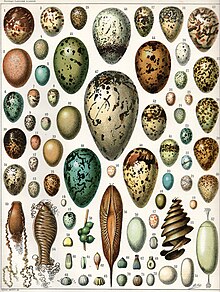
Back Oviparismo AN بيوضية Arabic Yumurta qoyan Azerbaijani Яйценосни животни Bulgarian Oviparnost BS Oviparisme Catalan Vejcorodost Czech Oviparie German Ωοτοκία Greek Ovonaskulo Esperanto

Oviparous animals are animals that reproduce by depositing fertilized zygotes outside the body (known as laying or spawning) in metabolically independent incubation organs known as eggs, which nurture the embryo into moving offsprings known as hatchlings with little or no embryonic development within the mother. This is the reproductive method used by most animal species, as opposed to viviparous animals that develop the embryos internally and metabolically dependent on the maternal circulation, until the mother gives birth to live juveniles.
Ovoviviparity is a special form of oviparity where the eggs are retained inside the mother (but still metabolically independent), and are carried internally until they hatch and eventually emerge outside as well-developed juveniles similar to viviparous animals.
© MMXXIII Rich X Search. We shall prevail. All rights reserved. Rich X Search